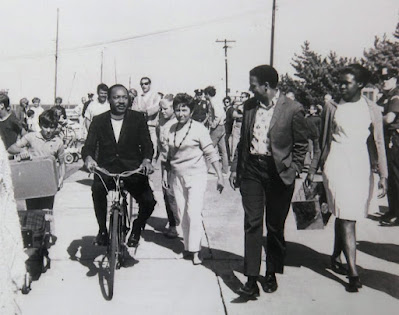When the bike lane came to Crescent Street, people didn't wonder whether they'd be priced out of the neighborhood. It didn't price me out: My rent was the same on the day I moved as it was three and a half years earlier, when the bike lane opened. I moved mainly because a senior apartment (don't tell anybody!) became available.
But others see those green strips of asphalt with white borders (or, in some cases, bollards or other separators) as conduits of class warfare. While they might own their homes, they worry about the face and faces of their communities changing.
Such anxieties are felt and expressed (sometimes overtly) mainly in older white working-class enclaves and communities of color. From Hasidic Jews and other religious conservatives who don't want "scantily clad" cyclists (and "sexy-ass hipster girls") rolling past their abodes to working parents who ferry themselves to work and their kids to school in cars and minivans and complain they "can't park" and they're "always stuck in traffic" to poor Blacks and Hispanics who feel abandoned by their cities and country, people in communities where few adults ride bikes for recreation (and certainly aren't riding the latest carbon-fiber technowonder) see cyclists--especially cycling activists and advocates--as younger, whiter, richer or more libertine than themselves. Oh, and many of us are childless or have only one child, in contrast to the large families many poor, religious and other people support.
So in a way, I can understand why some people sigh "There goes my neighborhood!" when a bike lane comes to their doorstep. To put it in pedantic, schoolmarmish terms, they are equating correlation with causation. That is also understandable: When people don't know the underlying reasons for a phenomenon, they tend to link any two events they see simultaneously. And it's true that in my hometown of New York, you are more likely to ride in a bike lane if you're on the Upper East Side of Manhattan than if you're living and riding in the decidedly non-gentrified, non-hipster Brooklyn neighborhood of East New York.
In my observation, if there is any cause-and-effect relationship between bike lanes and gentrification, it's actually the reverse of what many people believe: If anything, gentrification leads to the building of bike lanes in one neighborhood. Those paths are usually constructed along long corridors that lead from one neighborhood into another. So a lane like the one along Kent Avenue in Brooklyn began in the gentrified/hipster areas of Greenpoint and North Williamsburg and was extended down to the ungentrified areas of South Williamsburg, where most residents are members of large Hasidic families. And another Brooklyn bike lane, along Fourth Avenue, extends from the mostly White and Middle Eastern enclaves of Bay Ridge through the mainly immigrant Chinese and Mexican communities in Sunset Park and, from there, into working-class neighborhoods near Greenwood Cemetery and on to uber-gentrified Park Slope.
If anything, such lanes should be equalizers: People from poor as well as affluent communities can use them to bike (or ride their scooters) to work, school, shop or just for fun. I think, perhaps, more people would see them that way if more bike activists and advocates looked and talked (ahem) less like me!


.jpg)





